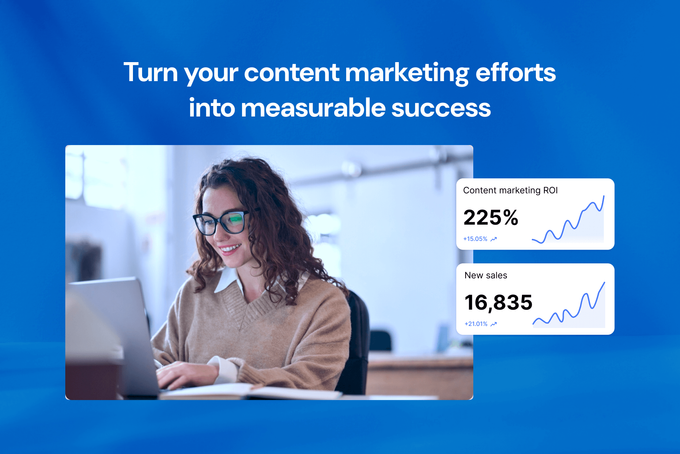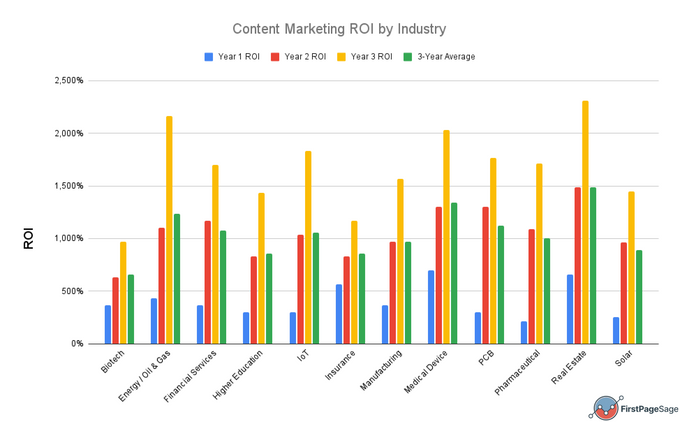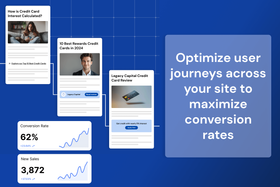Content marketing ROI: How to measure impact and drive results
Learn the key steps to accurately measure content marketing ROI and see if your strategy is driving the growth your business needs.
Updated February 27, 2025

AI Summary
Measuring content marketing return on investment (ROI) is a critical step in understanding the true impact of your efforts. Without tracking and analyzing the results, you can't know if your content is truly moving the needle for your business. In this article, I'll explain the steps to calculate content marketing ROI, discuss how ROI can vary across industries, and which metrics to track.
Key takeaways
- User journeys are complex, so attribute value to every step. Otherwise, you're not measuring properly.
- Because ROI varies by industry, you need to understand what type of content marketing works for you.
- Do proper research to understand what type of strategy can apply to your business.
What is content marketing ROI?
Content marketing ROI is a percentage that tells you how much you earned from your content marketing activities compared to what you spent. This includes all costs, such as content creation, distribution, SEO, and any other expenses related to your content marketing strategy.
Simply put, measuring your ROI lets you know if your content marketing efforts are paying off or just draining your budget. That way, you can decide whether to allocate more resources to content marketing, scale back, or even stop altogether. Without measuring ROI, you risk spending time and money on efforts that don't contribute to your bottom line.
How to measure content marketing ROI
To determine whether your content marketing activities are successful, you can use the standard content marketing ROI formula. Here's how to calculate it step by step.
1. Start by calculating your content marketing costs
First, you need to calculate all the expenses involved in your content marketing process. This includes content creation costs, such as content writers, editors, designers, and any tools or software you use.
You also need to account for distribution costs, such as expenses for advertising, social media platforms, email marketing tools, influencer sponsorships, etc. Lastly, factor in the costs of analytics tools and any other resources dedicated to measuring and optimizing your content's performance.
» Chat with us to find ways to create content for less.
2. Calculate the revenue generated from your content
Next, you need to calculate how much you earned from your content. This can be relatively straightforward if a user reads a blog post, clicks a call-to-action (CTA), and makes a purchase. However, in many cases, the relationship between content and sales is less obvious.
Attributing sales to your content can be challenging, especially when the user journey includes multiple touchpoints. Entail CRO offers a solution to this challenge with its goal attribution model, which accurately measures the impact of your content marketing efforts across different pages and channels. It provides a clear view of where your traffic comes from and the value each page generates, allowing you to see how your content contributes to your revenue.
3. Calculate your content marketing ROI
Once you've worked out all the costs and sales related to your content marketing efforts, you can calculate content marketing ROI using this formula:
So, if your total investment in content marketing is $5,000 and the revenue generated from the content is $10,000, your ROI would be 100%. This means that you earn two dollars for every dollar you spend on content marketing.
» Learn how to measure SEO ROI.
What is the average ROI of content marketing?
While it's important to consider before you start investing in content marketing, finding an average ROI is easier said than done because it can vary widely per industry. It's not just about whether a business is B2B or B2C—it's about how much the industry relies on content to guide customers through their sales funnel.
For example, First Page Sage measured the ROI of content marketing for several businesses, and their findings show how it varies across different industries.
Source
» Book a consultation to find out if content marketing is right for your business.
Which industries should invest in content marketing to maximize ROI?
Content marketing doesn't work for every business—it can be a goldmine for some and a poor investment for others. So, it's important to think carefully about whether content marketing is right for your business.
Take, for example, a $5 gaming add-on for PC gamers. There's a huge audience and a ton of content you could create around PC gaming, but the lifetime value of each user is pretty low. Even with a large amount of traffic, if each customer is only worth a little bit of money, it's hard to justify the cost of producing content. And if the content doesn't target the right intent or isn't designed with conversion in mind, the number of people who actually make a purchase will be small, leading to a low or even negative ROI.
Now, compare this to an online therapy service, where a user's lifetime value can be as high as $500. There's also often high intent behind search queries like "online therapy for teens" or "online therapy for married couples," which means you have a better chance of creating content that actually converts. With a decent conversion rate, this business could generate significant revenue from content marketing.
The reality is that for some businesses, like our hypothetical gaming company, the numbers suggest that the money would be better spent elsewhere. But for others, content marketing could be highly effective. So, before you start investing in content marketing, ask yourself: Does content marketing make sense for my business? Which types of content marketing should I use?
Content marketing metrics to monitor
When measuring the success of your content marketing, especially for SEO, these key metrics can provide some additional insights into your content's performance:
- How many queries you rank for: The total search queries for which your pages are ranking.
- Keyword positions: The ranking positions of your most important keywords.
- Impressions: How often your content appears in search results.
- Organic traffic: The total number of visitors coming from non-paid search results.
- Clicks: The number of visits to your site from search engines.
- Time on page: The average time users spend on your content pages.
- Bounce rate: The percentage of users who leave your site after viewing just one page.
- Click-through rate (CTR): The percentage of users who see your content (or a specific element within it) and click on it.
- Engagement metrics: Metrics such as likes, shares, and comments that show how users interact with your content on social media or other platforms.
- Lead generation metrics: The number of leads generated from content, including form submissions, downloads, and other user actions that indicate interest.
- Conversion rate: The percentage of visitors who complete a desired action, such as filling out a form or making a purchase.
» Find out which content marketing KPIs you should be tracking.
Tracking these metrics across multiple pages can be challenging, especially if you're creating content at scale. Due to the sheer amount of data, it can be nearly impossible to do manually. Entail CRO can help streamline this process by providing a comprehensive way to track and measure performance across a large number of content pages. This allows you to make informed decisions to optimize your content marketing strategy and improve SEO ROI.
» Learn how to calculate your SEO conversion rate.
Measure the true value of your content
Measuring the ROI of your content marketing is about ensuring that every effort aligns with your business's goals and drives real results. Every piece of content should have a purpose, and understanding its impact can be the difference between just creating content and building a successful strategy. Are you getting the most out of your investment, or are you missing opportunities to improve the ROI of your content marketing? The data will tell you if you're on the right track.
» Book a demo to see Entail CRO in action, or try it for free.







